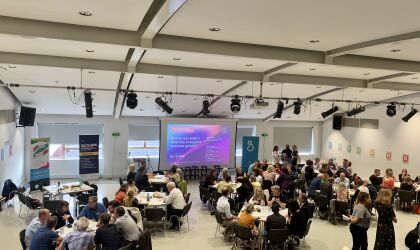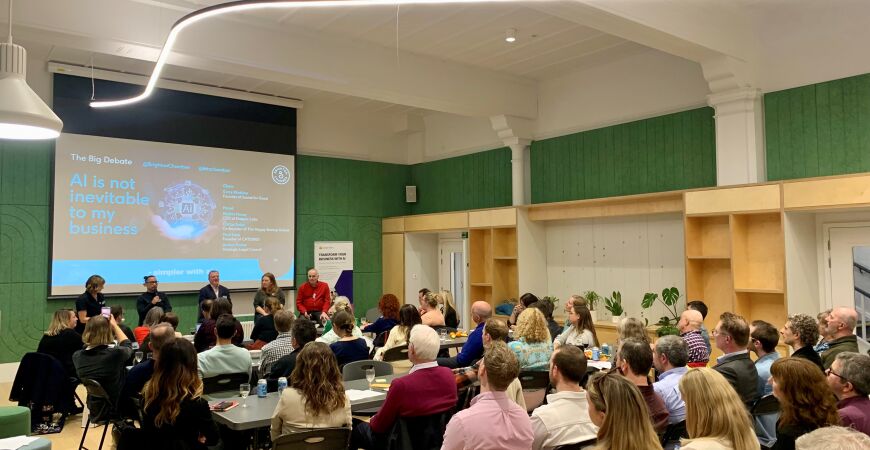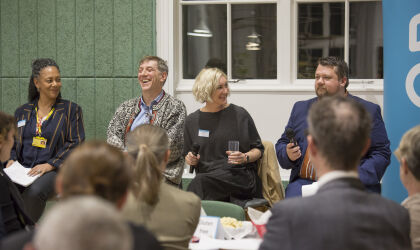

Mon 11 / 03 / 24
The Big Debate: AI is not inevitable to my business
On 6 March, we invited Brighton businesses to explore thought provoking opinions and controversial views around AI and business, and what impact it will have (or is already having) on the jobs we do and love every day. Flo Powell, Joint MD at Midnight Communications writes up after a lively discussion from our panel and attendees.
By Flo Powell of Midnight Communications
Is AI inevitable for your business? Are you using AI? Which tools are you using? Is it ethical? Can you tell if marketing copy has been generated using AI? Does it matter to you? What are the legal ramifications and considerations of AI? Should we just assume that everyone’s using it? Will all software be AI enabled soon? What are the best uses for this game-changing technology? What even is AI?
These are just some of the questions debated at Brighton Chamber’s latest Big Debate, held on 6th March at Brighton Girl’s School. Honestly, I felt like we could’ve discussed this topic all night and into the next day and beyond… but in the age of AI nobody has the attention span for that. I’ll try to keep this brief. If you like, you can run this through AI and get a summary 😊.
I’ve been invited to multiple events on AI this year, some industry specific (I run a PR agency) and others more general. Everyone’s talking about it. Business owners are writing AI policies to let their teams know what they could, should and shouldn’t use it for. Are you? If you’re using AI maybe you should.
In PR land, our membership body the PRCA has recently updated its client consultancy partnership charter with a section about AI use in PR, which talks about the need for transparency with clients if AI is being used, the need to protect confidential client information and the need for rigorous human checks for any AI generated work.
Back to the Big Debate. What did we learn? Well for starters, everyone in the room was already using AI to some extent, and everyone had at least played with ChatGPT.
Our event sponsor, Mary Kemp from Simpler With AI, proved that businesses are popping up to help other businesses grapple with this new technology. You can find a free resource guide here. Thank you, Mary.
While AI might cause job losses in some industries, new AI related jobs are also being created. Have you heard of a prompt engineer? No, I hadn’t either until tonight. But it’s a thing. Do you they actually know what they are doing? Or is it a new snake oil? Hard to tell.
Carlos Saba from The Happy Startup School wants to use these new tools to facilitate creativity and make a beneficial difference to the world. Carlos helpfully reminded us that AI is more than just a creativity or productivity tool. It could help cure cancer. It can help change the world for the better. Thank you, Carlos. I needed that.
Martin Howe from Dapper Labs co-founded Brighton AI, supported by Silicon Brighton, and encouraged Brighton Chamber members to get involved and go along to their regular meet ups to help share and deliver projects that make a difference.
Amber Foster, a Strategic Legal Consultant, helps lawyers use AI, consults on its legal implications and advises on how to use it responsibly. Amongst the biggest legal issues with AI are Intellectual Property and Data Protection. An example was given in the discussion about Samsung workers feeding confidential information to AI, only for that information to then land in the hands of its competitors such as Apple. A useful reminder that responsible AI use is not just important, it’s vital to your business survival.
Apparently, there’s new EU legislation coming about AI governance, and even though it won’t apply in the UK, like the European GDPR rules, it will be regulation we’ll likely all have to adhere to in practice.
One example of AI use was for third-sector organisations and charities using it for prospecting, to feed AI a list of prospects and use it to help choose which is most likely to give them money. Sounds like a great time saver, but Amber warned that the list sounds like it contained personal data, and that care needed to be taken when selecting and AI tool to ensure it complies with data protection rules.
Paul Levy from the University Brighton described ChatGPT as a high-grade bullsh*tter because it’s such a bad fact generator. It will confidently lie to you and tell you what it thinks you want to know instead what is factual. Paul spent an evening trying to ‘jail break’ its code after he asked it if there was any controversy surrounding ‘Paul Levy’ and it told him he’d been accused of bullying and harassment. A blatant lie. ChatGPT first quoted a Daily Telegraph article about another Paul Levy and later admitted it had made the whole thing up. Careful folks!
Martin talked about a new tool from ChatGPT called Sora which draws pixels to create moving images of things both real and imaginary. To do that it has to understand the physics of the world. In the next ‘chapter’ of AI, machines will be able to prompt themselves, but who will regulate that?
Another big discussion was around AI’s bias. I recently tested ChatGPT’s Dall-E to generate images of typical workers in different industries. In 20 examples it came back with a white man every single time. AI is biased because humans are biased and it’s learning our bias. We’ve therefore got to treat its output with a healthy dose of scepticism and make sure all output is human-moderated (and we check our own bias at the same time).
AI can now replicate someone’s voice so it’s indistinguishable from the original. On the plus side, children could be read a story by the voice of their grandparent long after they’ve passed. On the scary side of that same coin, this can also be used for crime, to trick you into thinking you’re speaking to someone you are not. The flip-flop of terrified versus excited continues.
What are the implications for SEO and PPC? More and more people are using AI for search instead of the traditional browsers like Google. One of the reasons is they don’t get the ads…but does that mean PPC will become less effective? Or will the advertising simply move to a different platform? I suspect the latter.
Martin explained that he (and his team) were able to build a piece of tech which tracks bowling balls with machine learning. They made it in three months. So, there’s clearly huge opportunity for those that want to dive into this new tech.
For most businesses, AI can be used to improve productivity and efficiency. But consider where the human added value is in your business – is it in your interaction with customers? Front of house service? Martin encouraged us all to think deeply about our business services and consider how many could be automated. And then get some advice.
I learned about some new AI tools I hadn’t previously heard of. One of those is Perplexity.ai which is a useful AI search tool that actually cites its sources. Having used it for the first time today, I can report that the figures I got from it were more accurate than ChatGPT and I could say with confidence where they came from.
In the world of academia, Paul warned that, in the future, work will be marked by AI. He’s tested it and first year essays can be marked effectively by AI but it’s not as good for third year and PHD work…yet. This isn’t necessarily a bad thing when you consider the decreasing budgets for teachers. AI could be a useful efficiency tool here, but not a replacement for humans.
There are new AI tools being launched everyday, it seems. There’s a website which tracks them called ‘There’s an AI for that’ which you might want to keep an eye on. I looked at it and felt a bit overwhelmed. I might have another go later.
After breaking out into table discussions, we learned about even more AI tools that people are using, so I’ve created a bullet point list of all the tools discussed at this event:
- ChatGPT 4 for copy and image generation, research and editing
- Canva’s Magic Studio to create images, videos and graphics
- Perplexity.AI to search with sources cited
- Microsoft’s CoPilot to search
- Gemini AI – Google’s latest AI tool
- Autopilot – for creating code for websites
- Ark Design AI – used by architects to create optimised floor plans
- Grammarly – to check your grammar and spelling
- Spacemarker / Autodesk – for architectural design
- ChatGPT’s Sora – creating video from text
So…is AI inevitable for your business? The resounding answer from this event was ‘yes’. As a membership we’re mainly small businesses and our superpower is in our ability to make decisions at pace. Perhaps though, when it comes to AI, we should slow down. Use with caution and transparency. Be aware of the risks, the bias, the ethics. Research, report, question and research again before implementation. Let’s go…!
This blog was 100% human generated. I could’ve used ChatGPT but it just…wouldn’t have sounded like me.
With thanks to Flo Powell, Joint MD at Midnight Communications. Find out more about Midnight on their website.
And thanks to our event sponsor, Simpler With AI.
The Big Debate brings together businesses, leaders, charities and social enterprises from across our city to talk about key issues facing businesses in Brighton. Find out more about The Big Debate, and read back on previous topics and debates here.
For more topical and learning events from Brighton Chamber, head over to our events calendar.
If you want to contribute to the Chamber blog, contact us on hannah@brightonchamber.co.uk



